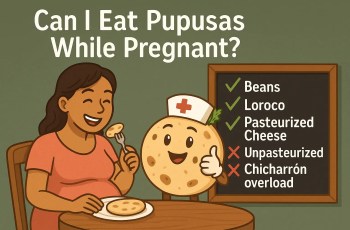You’re enjoying a hot pupusa—cheese stretching, curtido spilling over—and your cat jumps up with that I-want-a-bite-too look. You pause mid-chew and ask yourself: Can cats eat pupusas?
Let’s answer this clearly:
Cats should NOT eat pupusas. While a tiny lick won’t likely harm your furry friend, the ingredients commonly found in pupusas can be unsafe, unhealthy, or outright toxic to cats.
In this post, we’ll break down:
- Why pupusas aren’t feline-friendly
- Which ingredients are most dangerous
- What to do if your cat sneaks a bite
- And how to make a safe “pupusa-style” treat for your kitty
No, Cats Should Not Eat Pupusas
While pupusas are amazing for humans, they’re full of ingredients that do not align with a cat’s dietary needs. Cats are obligate carnivores—which means their bodies are built to digest meat and only meat, not corn, cheese, or beans.
Let’s Break Down the Ingredients
🌽 The Masa (Corn Dough)
- ❌ Not toxic, but not useful
- Cats can’t properly digest carbohydrates
- Corn adds empty calories and can cause digestive upset
🧀 The Cheese
- ⚠️ Many cats are lactose intolerant
- Cheese can cause vomiting, gas, and diarrhea
- High in fat and sodium, which cats don’t need
🫘 Beans
- ❌ Not toxic but indigestible
- Cause gas and bloating
- Often cooked with onion or garlic (see below)
🐖 Chicharrón (Pork)
- ❌ Fatty, salty, and often spicy
- May contain seasonings that are toxic
- Too much fat = pancreatitis risk for cats
🌺 Loroco or Veggies
- Loroco isn’t proven toxic to cats, but it’s not tested either
- Onion, garlic, and many seasonings used in curtido or fillings are highly toxic to cats
Salsa and Curtido: Definitely NO
- Salsa roja contains onions and garlic, both of which are TOXIC to cats
- Curtido includes vinegar, spices, and fermented ingredients that can upset a cat’s stomach
- Even small amounts can lead to lethargy, drooling, or vomiting
🚫 NEVER give your cat food that contains garlic, onion, or heavy spices—they damage red blood cells and can cause anemia.
What If My Cat Ate a Bite of Pupusa?
✅ If they took a small bite of plain masa or cheese:
- Likely no emergency
- Monitor for vomiting, diarrhea, or changes in appetite
⚠️ If they ate:
- Chicharrón
- Onion or garlic
- Salsa or curtido
Call your vet immediately. Even small amounts of onion or garlic can be dangerous, especially for kittens or senior cats.
Why Do Cats Try to Eat Pupusas?
Because they smell:
- Cheesy and fatty (irresistible)
- Warm and soft (appealing texture)
- Meaty and savory (especially with chicharrón or beans)
But remember: curiosity doesn’t mean compatibility. Just because your cat wants a bite doesn’t mean it’s safe.
Can I Make a “Cat-Safe Pupusa”?
Absolutely! Here’s a fun treat inspired by pupusas—cat-friendly and nutritious.
🐱 DIY Cat Pupusa Recipe (makes 2 mini treats):
Ingredients:
- ¼ cup shredded boiled chicken or turkey (unseasoned)
- 1 tsp mashed sweet potato or pumpkin (for texture)
- 1 tsp grated cat-friendly hard cheese (optional)
- 2 tbsp oat flour or mashed plain rice
Instructions:
- Mix ingredients into a dough.
- Form two small discs and flatten gently.
- Bake at 350°F (175°C) for 8–10 minutes.
- Let cool completely before serving.
Feed only as a treat. Not a meal replacement!
Summary
No, cats should not eat pupusas. While they’re safe and delicious for humans, pupusas are high in fat, salt, dairy, and seasonings that can harm your feline friend—especially garlic and onions, which are toxic. If your cat eats a pupusa, monitor them closely or contact your vet. For a safer option, make your own cat-friendly version using plain meats and simple ingredients.





